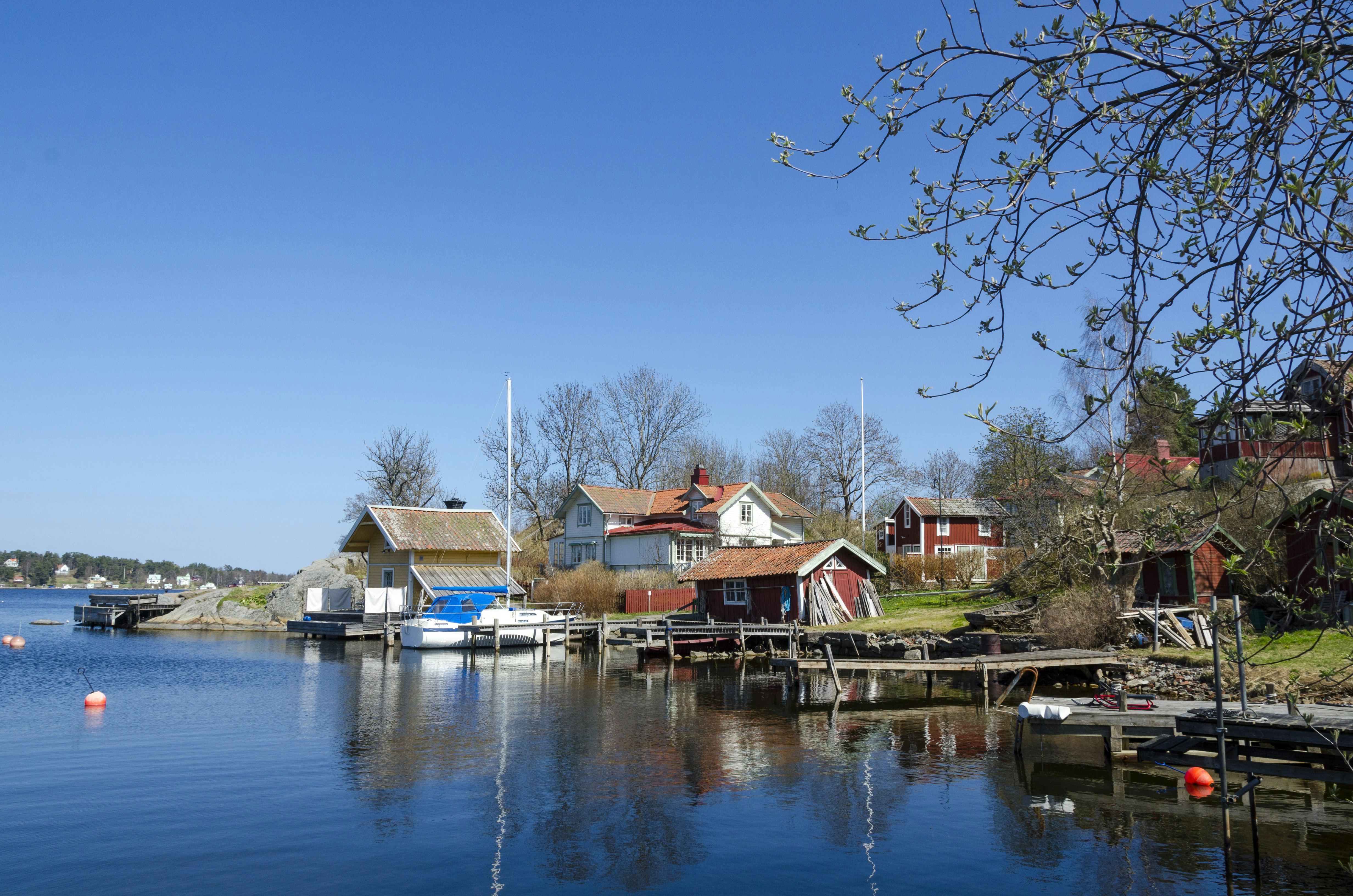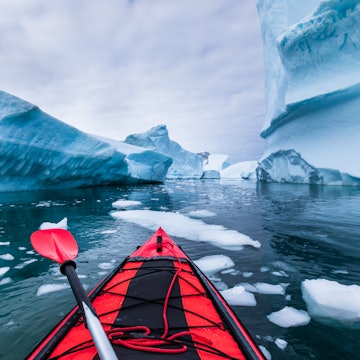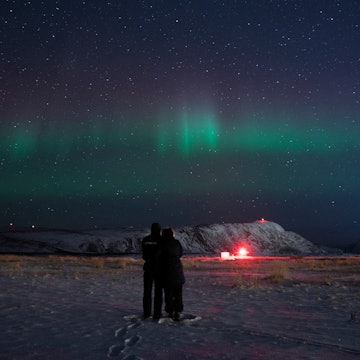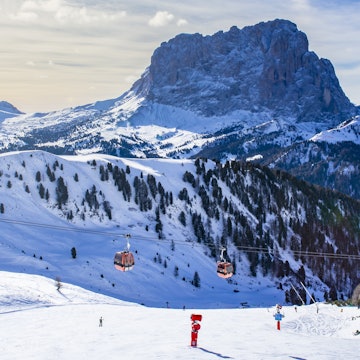

Stockholm is home to many brilliant museums. keladawy/Getty Images
Sweden’s attractions are endless. Get ready for unspoiled nature, world-class museums, fascinating history, beautiful cities and towns, vibrant traditions and a creative spirit that makes itself known in everything from science, technology and the arts to the country’s ever-evolving culinary scene.
Whether you’re seeking outdoor adventure, urban attractions or some combination of both, you’ll find it in Scandinavia’s largest country. These are our favorite things to do in Sweden to help you experience its magic to the fullest.
1. Fall in love with beautiful Stockholm
“Of cities I know in the world, you are the one with it all,” wrote Swedish singer-songwriter Lasse Berghagen in a famous musical love letter to Sweden’s capital, “Stockholm i mitt hjärta” (Stockholm in My Heart). Berghagen was right – Stockholm is a charmer.
The city has enough museums, historic buildings and other attractions to keep you busy for weeks, but some of its greatest pleasures are the simplest ones, found in its vibrant neighborhoods. Wander the medieval alleys of Gamla Stan, stroll along Strandvägen and the Djurgården Canal, admire the panoramic views from Södermalm, then catch a summer sunset over Mälaren.

2. Island-hop in the Stockholm archipelago
Some 30,000 islands and skerries make up the scenic Stockholm archipelago, scattered over an area of nearly 1,680 sq km. If you’ve got limited time, soak up some island vibes at Fjäderholmarna, just a 25-minute boat ride from downtown Stockholm, or take a guided archipelago cruise.
Year-round passenger ferries and speedier summer excursion boats service destinations throughout the region, including Vaxholm, Grinda, Finnhamn, Möja and Sandhamn, which are great day trip spots but also have accommodations if you’d like to stay and explore.
3. Take a hike
Swedes love nature – so much so that the right to enjoy it freely is enshrined in law. No matter where you are, it’s easy to lace up your hiking shoes and hit the trail, whether for an urban hike in Stockholm’s Royal National City Park, a day trip to a rural nature reserve or a multi-day trek on one of Sweden’s many long-distance hiking routes, found in every region of the country. An excellent public transportation network makes even remote trails accessible by bus, train or ferry. The Swedish Tourist Association is a good starting point for hiking suggestions in every corner of the country.
Planning tip: Though the right to roam is an intrinsic part of Swedish society, there are conditions attached to preserve the landscapes for everyone. Check the relevant rules before setting out to ensure a wonderful experience.
4. Cruise the Göta Canal
One of the most ambitious construction projects in Swedish history, the Göta Canal connects the Baltic Sea with the country’s largest lakes, Vänern and Vättern, linking up with the Trollhättan Canal for a full coast-to-coast crossing complete with 66 locks and two aqueducts.
A canal cruise is a delightful way to experience the lush green countryside, quaint villages and other attractions along the route, with itineraries ranging from day trips to multi-day journeys on historic canal boats.
Planning tip: If you prefer a do-it-yourself cruise, you can rent a boat and travel at your own pace.
5. Explore southern Sweden on a bike
Another great way to experience the Göta Canal is by biking along the towpaths – 87 car-free kilometers (54 miles) in all. Be sure to stop at Berg and Borenshult to watch boats passing through impressive multi-lock staircases.
Further south, Sweden’s three linked cycling routes are perfect for day trips or long-distance journeys. The 274km Sydostleden trail runs south from Växjö through the fields and forests of Småland and along the coast of eastern Skåne. At Simrishamn, Sydkustleden takes over, continuing 260km along the south coast past white-sand beaches and historic cities and towns. From Helsingborg, Kattegattleden follows the scenic west coast for 390km, all the way to Gothenburg.

6. Ride the rails on Inlandsbanan
For a rail journey through some of Sweden’s wildest and most beautiful scenery, take a ride on Inlandsbanan (the Inland Line). Starting in Mora, the train travels north to Gällivare, about 100km north of the Arctic Circle, making numerous stops along the way.
Grab the opportunity to visit attractions such as the Arctic Circle, Östersund’s Jamtli local history museum and the Ájtte Museum in Jokkmokk. A wonderful way to see the interior of northern Sweden, the route also provides access to long-distance hiking trails and the potential to spot some of the region’s abundant wildlife.
Detour: For a deeper connection to Sámi culture, head to Båtsuoj Sami Camp, where you can learn about reindeer herding, taste traditional food and experience indigenous crafts. It’s an enriching complement to a Lapland journey.
7. Search for the Northern Lights
Sweden’s far north is widely recognized as one of the top places in the world to experience the aurora borealis (Northern Lights), a frequent occurrence between September and March. Few sights can compare to the magic of seeing brilliant waves of green, red, blue and purple dance across the darkened sky, the result of electrically charged solar particles colliding in the Earth’s atmosphere.
Abisko National Park is renowned as one of the world’s best Northern Lights destinations, thanks to its clear skies, lack of light pollution and position within the auroral oval – a band around the Earth’s magnetic pole where auroras are most likely to form. East of Abisko, Kiruna, Sweden’s northernmost city, also makes a good base with many tour companies offering aurora-seeking excursions, including by skis, snowshoes and dog sleds.

8. Paddle a scenic waterway
Sweden’s long coastline, thousands of lakes and many islands make it an ideal paddling destination. In Stockholm you can rent kayaks, canoes or stand-up paddle boards at various locations including Långholmen, Kungsholmen and Djurgården. Kayak and canoe rentals are also available in other cities including Gothenburg and Malmö.
For something less urban, the Bohuslän coast, Skåne’s rugged Kullaberg peninsula and the High Coast region are all great kayaking destinations, as are the St Anna archipelago near Söderköping and the islands around Piteå and Luleå in the far north. Sweden’s inland waterways, including roughly 100,000 lakes, also provide endless scope for paddling with equipment rentals and guided tours available throughout the country.
9. Savor the west coast lifestyle
Some people call Sweden’s west coast the “best coast.” While east coasters may quibble, there’s no denying there’s something special here. The region’s undisputed hub is Gothenburg, a lively port city with popular festivals and outstanding restaurants, shopping and attractions.
After a taste of urban pleasures, head north to Bohuslän, an almost impossibly beautiful region of deeply indented rocky coastline dotted with picturesque fishing villages that fill with life during the summer months.
For a cultural diversion, check out Röda Sten Konsthall, a striking riverside warehouse turned contemporary art center. Its ever-changing exhibitions, graffiti-covered façade and lively café make it a favorite with locals as much as visitors.
Detour: If you prefer beaches over rocky shores, head south from Gothenburg to Halland, where you’ll find lovely stretches of sand around Varberg, Falkenberg and Halmstad.

10. Eat your way through Sweden
Though perhaps best known internationally for meatballs and pancakes, Sweden has developed an exciting culinary scene that blends classic dishes with international influences, emphasizing sustainability and locally sourced, seasonal ingredients. From Michelin-starred restaurants to casual cafes and vibrant urban market halls, you’ll find a wide range of fantastic places to sample Sweden’s flavors all over the country.
To delve deeper into Swedish food culture, take a seafood safari in Bohuslän, tour the vineyards of Skåne, join an autumn truffle hunt on Gotland, or simply head into the forest to pick blueberries, lingonberries or chanterelle mushrooms, which Swedes call “forest gold.” A guided foraging walk in Swedish Lapland is a perfect way to learn more about edible Swedish nature.
11. Road trip through the Swedish countryside
With well-maintained roads, good signage and incredible sights scattered throughout the countryside, Sweden is perfect for a driving vacation. Although major highways will get you from point to point quickly, the great joy of a Swedish road trip is meandering along secondary routes through dense forests and pretty small towns, past sparkling lakes, spectacular coastlines and rolling farmland dotted with red-painted cottages with white trim.
Planning tip: The downside of driving in Sweden is the steep price of car rentals and fuel, but you can reduce the cost of the latter – as well as your environmental impact – by renting a hybrid or even an electric car. Electric charging stations are available throughout the country; ChargeFinder is a good resource.

12. Visit castles, palaces, fortresses and ancient graves
Sweden has hundreds of historic castles, palaces and stately homes concentrated in the country’s southern third. Tour Stockholm’s massive Kungliga Slottet (Royal Palace), stroll through the beautiful gardens of lakeside Drottningholm Slott or go back in time at the turreted Renaissance castles of Gripsholm, Vadstena and Kalmar. On Öland, don’t miss the fire-ravaged ruins of 13th-century Borgholms Slott. There are also many interesting smaller castles such as Skokloster, Sofiero and Läckö.
Various historic fortresses also recall times when Sweden was much less peaceful and secure. For centuries, Vaxholm Fortress helped defend Stockholm against Danish and Russian attacks. North of Gothenburg, well-preserved Carlstens Fästning, from 1658, occupies a commanding position atop Marstrand island, while 14th-century Bohus Fästning in Kungälv witnessed many significant events before falling into atmospheric ruin.
A more somber location, Gamla Uppsala is one of Sweden’s most important ancient sites, with more than 300 burial mounds dating from the 6th to 12th centuries. The three largest mounds are thought to hold legendary kings from the sagas – though archaeologists now believe at least one belonged to a young female regent. You can explore the grassy site on foot or by bike, pausing at the Gamla Uppsala Museum.
13. Visit family-friendly museums
Sweden’s museums aren’t just for adults – many are designed with younger visitors in mind. In Gothenburg, Universeum blends science, nature and play, with a rainforest, aquariums and hands-on experiments that keep kids busy for hours. North in Uppsala, Museum Gustavianum dives into history with treasures from the city’s university, including an anatomical theater from the 1600s and a collection of Viking artifacts. Both are ideal stops if you’re traveling with family, or if you’re simply curious at heart.
Take your Sweden trip with Lonely Planet Journeys
Time to book that trip to Sweden
Lonely Planet Journeys takes you there with fully customizable trips to top destinations–all crafted by our local experts.
























